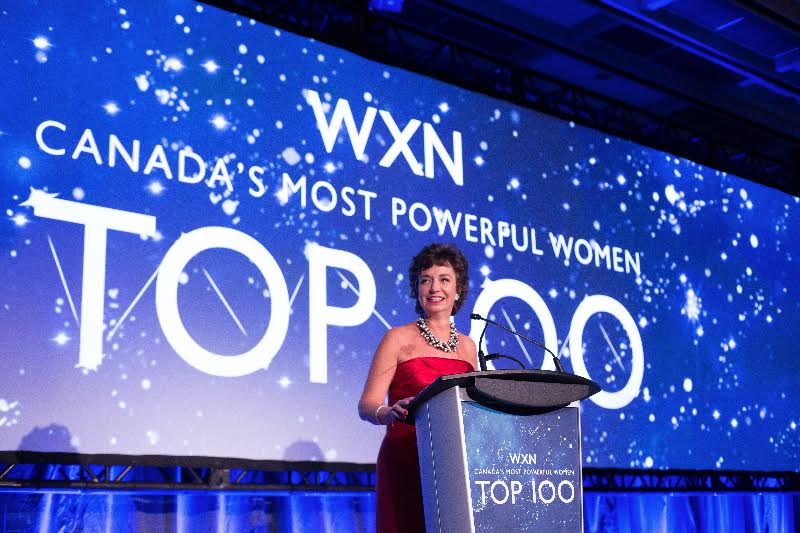Last night, the Women’s Executive Network honoured some of Canada’s most successful leaders in their annual Canada’s Most Powerful Women Top 100 event. While the financial industry still dominates the wins, the range of professions is diverse and interesting. Sabrina Geremela, Managing Director, Integrated Solutions, Google; Eleanor Wachtel, host of CBC Radio’s Writers & Company; Karen Flavelle, owner & CEO of Purdy’s Chocolatier; Shelby Walsh, President of Trend Hunter; Ilona Dougherty, President & Co-Founder of Apathy is Boring; Mandy Rennehan, Founder & CEO of Freshco (who we interviewed a few weeks back): power isn’t reserved for those who bang a gavel or make millions. So what is it, exactly? What makes a woman “powerful,” and do we still need the power-blazer to feel comfortable wearing this word? Hopefully not, but women still shrug off their success more than men.
We spoke with WXN founder, Pamela Jeffery, to discuss power: who’s got it, how you get it, how it has changed since the awards launched in 2003, and why it’s important to acknowledge it.
What does the word “powerful” mean to you?
When I came up with the idea to celebrate women in leadership roles, I chose the word powerful because, to me, it meant that a woman had made choices that empowered her and had an impact on her organization as well as our country. Her influence went beyond her organization to include her community. When we think about individuals who are powerful, historically, there have not been many women. To me, it addressed the notion that there are many women in leadership roles who are not as well known. They are powerful, as we define powerful to be, but they are traditionally overlooked.
What are the objectives of Canada’s Most Powerful Women Top 100 gala?
The objectives of the gala is to shine a light on women in leadership roles for three main reasons: so that it becomes the norm; so that the next generation can see women in these roles and be inspired to lead; so we can encourage organizations to increase the number of women in leadership roles. It’s not a supply issue, it’s a demand issue.
What has changed since 2003?
Back in 2003, there were more nominees and winners in roles that didn’t include operational responsibility. That’s the first trend. The second is that Corporate Directors is a newer category and that reflects the growing board seats reached by women. In 2003, women made up 11.7% of the board. This year Canada reached 19%. Now, almost 1 in 5 of board seats are held by women. We’ve seen the fastest growth in the past 24 months.
These are very successful women. What factors do you attribute to their success?
Tenacity and grit; that elusive work-life balance; sheer will; having a supportive partner; owning their ambition. Women who are really successful career-wise aren’t afraid to own their ambition. They’re not afraid to put up their hand and say, “I want that promotion.” They put in the time that is required. Also, many of them were encouraged and mentored.
What’s your best advice for finding a mentor?
Make it happen. Look around you. Look at people who are already in your own network. You may have a mentor already but you just don’t think of them as a mentor. I had men and women; I think having both is healthy. You can be part of an organized mentoring program, like the ones we offer at WXN, or you can opt to do something on your own. It’s really important to decide where you want to be in 5 or 10 years and look at who the successful people are in your field. How do you connect with individuals who are successful in your field? How do you give back? Mentoring is a two-way relationship where both mentor and protege can learn from each other.
Beyond our workplace, what’s a great way to keep learning and develop our skills?
Volunteer on boards! Reach out. Make yourself available. Say, “I’d really like to get involved in this organization, and these are the skills that I can bring.” That’s a great way to gain knowledge, learn about operations, meet people who you’d otherwise not meet, give back to your community and hone business and leadership skills.
The key to success: what’s your best advice?
The basics are just so fundamental. For me, life is about relationships. To be able to pick up the phone and call someone who is in your network is so valuable. You need to nurture those relationships, give back, offer assistance, work and collaborate, and don’t just try to gain something from someone. As in any relationship with others, it’s that day-to-day trust, honesty and building a relationship. It never ceases to amaze me how many folks will have an agenda but not have any particular interest in the person on the other side of the table.
Keeping up relationships is a lot of work, isn’t it?
It is. But it makes for a wonderful life.



 Follow Us On Instagram
Follow Us On Instagram
